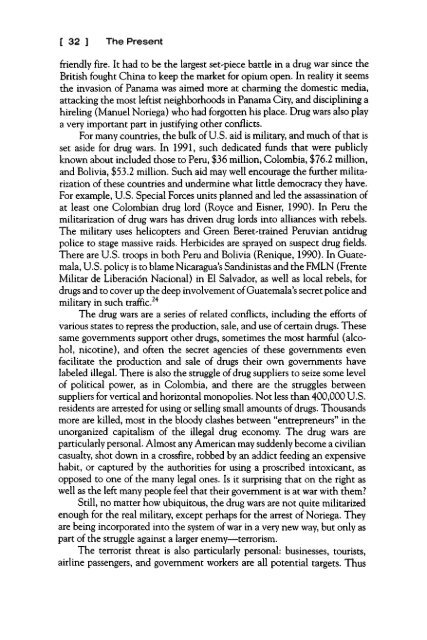entire book - Chris Hables Gray
entire book - Chris Hables Gray
entire book - Chris Hables Gray
Create successful ePaper yourself
Turn your PDF publications into a flip-book with our unique Google optimized e-Paper software.
[ 32 ] The Present<br />
friendly fire. It had to be the largest set-piece battle in a drug war since the<br />
British fought China to keep the market for opium open. In reality it seems<br />
the invasion of Panama was aimed more at charming the domestic media,<br />
attacking the most leftist neighborhoods in Panama City, and disciplining a<br />
hireling (Manuel Noriega) who had forgotten his place. Drug wars also play<br />
a very important part in justifying other conflicts.<br />
For many countries, the bulk of U.S. aid is military, and much of that is<br />
set aside for drug wars. In 1991, such dedicated funds that were publicly<br />
known about included those to Peru, $36 million, Colombia, $76.2 million,<br />
and Bolivia, $53.2 million. Such aid may well encourage the further militarization<br />
of these countries and undermine what little democracy they have.<br />
For example, U.S. Special Forces units planned and led the assassination of<br />
at least one Colombian drug lord (Royce and Eisner, 1990). In Peru the<br />
militarization of drug wars has driven drug lords into alliances with rebels.<br />
The military uses helicopters and Green Beret-trained Peruvian antidrug<br />
police to stage massive raids. Herbicides are sprayed on suspect drug fields.<br />
There are U.S. troops in both Peru and Bolivia (Renique, 1990). In Guatemala,<br />
U.S. policy is to blame Nicaragua's Sandinistas and the FMLN (Frente<br />
Militar de Liberacion Nacional) in El Salvador, as well as local rebels, for<br />
drugs and to cover up the deep involvement of Guatemala's secret police and<br />
military in such traffic. 24<br />
The drug wars are a series of related conflicts, including the efforts of<br />
various states to repress the production, sale, and use of certain drugs. These<br />
same governments support other drugs, sometimes the most harmful (alcohol,<br />
nicotine), and often the secret agencies of these governments even<br />
facilitate the production and sale of drugs their own governments have<br />
labeled illegal. There is also the struggle of drug suppliers to seize some level<br />
of political power, as in Colombia, and there are the struggles between<br />
suppliers for vertical and horizontal monopolies. Not less than 400,000 U.S.<br />
residents are arrested for using or selling small amounts of drugs. Thousands<br />
more are killed, most in the bloody clashes between "entrepreneurs" in the<br />
unorganized capitalism of the illegal drug economy. The drug wars are<br />
particularly personal. Almost any American may suddenly become a civilian<br />
casualty, shot down in a crossfire, robbed by an addict feeding an expensive<br />
habit, or captured by the authorities for using a proscribed intoxicant, as<br />
opposed to one of the many legal ones. Is it surprising that on the right as<br />
well as the left many people feel that their government is at war with them?<br />
Still, no matter how ubiquitous, the drug wars are not quite militarized<br />
enough for the real military, except perhaps for the arrest of Noriega. They<br />
are being incorporated into the system of war in a very new way, but only as<br />
part of the struggle against a larger enemy—terrorism.<br />
The terrorist threat is also particularly personal: businesses, tourists,<br />
airline passengers, and government workers are all potential targets. Thus








